有关时间的英语表达
- 格式:doc
- 大小:15.50 KB
- 文档页数:2

英语表达时间的所有方法1.时间的英语表达一般有三种方法:a.使用时段:例如morning, afternoon, evening, night, sunrise, noon, dusk等;b.使用小时及半小时:例如12 o'clock, 12:30, 4 a.m., 11 p.m.等;c.使用表达特定一天或某一段时间的限定词:1)以一天为单位的表达:yesterday、today、tomorrow、this morning/evening、last week/month/year 等;2)以一段时间为单位的表达:in October、in January、fromApril to June这样的表达,也可以使用之前提到的具体某一天:on Monday、on May 15th;3)使用特定的表示持续时间的词汇:ago、for、since、after、before、until、in、within等。
2.当你需要给出更具体精确的时间时,可以使用以分秒作为单位的表达方法:a.使用特定的日期/时间:8:00 pm on March 10th、10.45 a.m on June 5th等;b.使用“点+分+秒”的表达法:3:33:21(代表3点33分21秒);c.使用“X点X分”的表达法: ten o'clock fifteen (代表10点15分)。
3.在表达时间的过程中,有些表示开始/结束的动词有特定的时间表达方式:a.begin/start:start at 8:00、begin at 9:30等;b.end/finish:finish at 5:00、end by 10:45等;c.持续:last for 3 hours、go on for 2 minutes等。
4.在表达未来某一时间段内发生的活动时,可以使用“be going to”来表示,例如We are going to visit the museum next weekend。
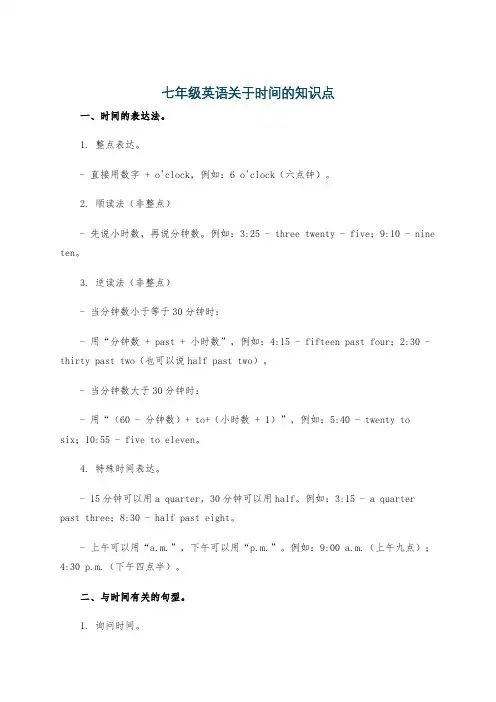
七年级英语关于时间的知识点一、时间的表达法。
1. 整点表达。
- 直接用数字 + o'clock,例如:6 o'clock(六点钟)。
2. 顺读法(非整点)- 先说小时数,再说分钟数。
例如:3:25 - three twenty - five;9:10 - nine ten。
3. 逆读法(非整点)- 当分钟数小于等于30分钟时:- 用“分钟数 + past + 小时数”,例如:4:15 - fifteen past four;2:30 - thirty past two(也可以说half past two)。
- 当分钟数大于30分钟时:- 用“(60 - 分钟数)+ to+(小时数 + 1)”,例如:5:40 - twenty tosix;10:55 - five to eleven。
4. 特殊时间表达。
- 15分钟可以用a quarter,30分钟可以用half。
例如:3:15 - a quarter past three;8:30 - half past eight。
- 上午可以用“a.m.”,下午可以用“p.m.”。
例如:9:00 a.m.(上午九点);4:30 p.m.(下午四点半)。
二、与时间有关的句型。
1. 询问时间。
- What time is it?(几点了?)这是最常见的询问时间的句子,口语中也可以说What's the time?- 回答可以是It's + 时间,例如:It's seven o'clock.2. 描述日常活动的时间安排。
- I get up at six thirty in the morning.(我早上六点半起床。
)- He goes to bed at nine o'clock at night.(他晚上九点睡觉。
)- 注意在具体的时间点前用介词at,在上午、下午、晚上等时间段前用介词in (如in the morning/afternoon/evening),如果是具体某一天的上午、下午、晚上则用on,例如:on Sunday morning(在星期天上午)。
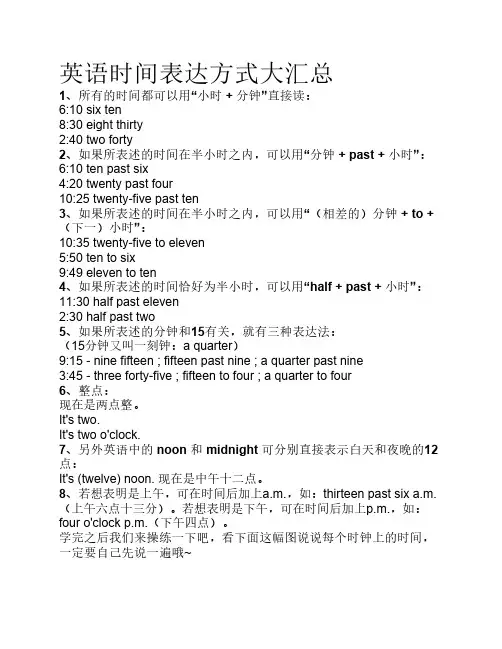
英语时间表达方式大汇总1、所有的时间都可以用“小时 + 分钟”直接读:6:10 six ten8:30 eight thirty2:40 two forty2、如果所表述的时间在半小时之内,可以用“分钟 + past + 小时”:6:10 ten past six4:20 twenty past four10:25 twenty-five past ten3、如果所表述的时间在半小时之内,可以用“(相差的)分钟 + to +(下一)小时”:10:35 twenty-five to eleven5:50 ten to six9:49 eleven to ten4、如果所表述的时间恰好为半小时,可以用“half + past + 小时”:11:30 half past eleven2:30 half past two5、如果所表述的分钟和15有关,就有三种表达法:(15分钟又叫一刻钟:a quarter)9:15 - nine fifteen ; fifteen past nine ; a quarter past nine3:45 - three forty-five ; fifteen to four ; a quarter to four6、整点:现在是两点整。
It's two.It's two o'clock.7、另外英语中的 noon 和 midnight 可分别直接表示白天和夜晚的12点:It's (twelve) noon. 现在是中午十二点。
8、若想表明是上午,可在时间后加上a.m.,如:thirteen past six a.m.(上午六点十三分)。
若想表明是下午,可在时间后加上p.m.,如:four o'clock p.m.(下午四点)。
学完之后我们来操练一下吧,看下面这幅图说说每个时钟上的时间,一定要自己先说一遍哦~。

一. 时间点的表达1、所有的时间都可以用“小时 + 分钟”直接读:6:10 six ten8:30 eight thirty2:40 two forty2、如果所表述的时间在半小时之内,可以用“分钟 + past + 小时”:6:10 ten past six4:20 twenty past four10:25 twenty-five past ten3、如果所表述的时间在半小时之外,可以用“(相差的)分钟 + to + (下一)小时”:10:35 twenty-five to eleven5:50 ten to six9:49 eleven to ten4、如果所表述的时间恰好为半小时,可以用“half + past + 小时”:11:30 half past eleven2:30 half past two5、如果所表述的分钟和15有关,就有三种表达法:(15分钟又叫一刻钟:a quarter)9:15 nine fifteen ; fifteen past nine ; a quarter past nine3:45 three forty-five ; fifteen to four ; a quarter to four6、整点的表达:现在是两点整。
It's two./It's two o'clock.另外英语中的 noon 和midnight 可分别直接表示白天和夜晚的12点:It's (twelve) noon. 现在是中午十二点。
It's (twelve) midnight. 现在是半夜零点。
7、大约时间:It's almost two. 马上到两点了。
It's not quite two. 还不到两点。
It's just after two. 刚过两点。
8、若想表明是上午,可在时间后加上a.m.如:thirteen past six a.m.(上午六点十三分)。
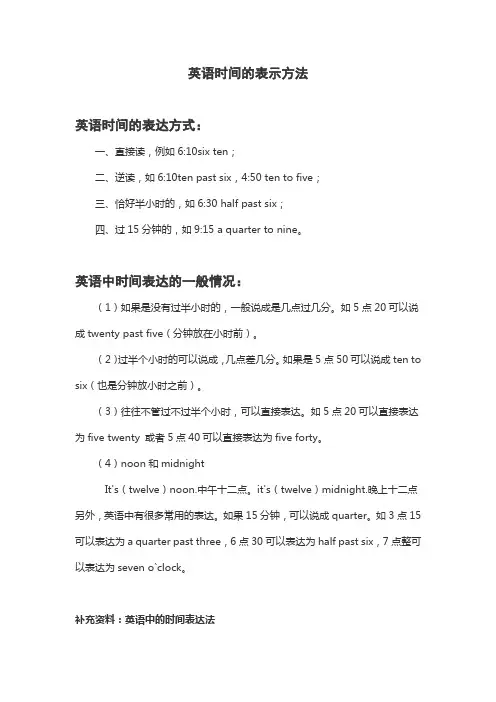
英语时间的表示方法英语时间的表达方式:一、直接读,例如6:10six ten;二、逆读,如6:10ten past six,4:50 ten to five;三、恰好半小时的,如6:30 half past six;四、过15分钟的,如9:15 a quarter to nine。
英语中时间表达的一般情况:(1)如果是没有过半小时的,一般说成是几点过几分。
如5点20可以说成twenty past five(分钟放在小时前)。
(2)过半个小时的可以说成,几点差几分。
如果是5点50可以说成ten to six(也是分钟放小时之前)。
(3)往往不管过不过半个小时,可以直接表达。
如5点20可以直接表达为five twenty 或者5点40可以直接表达为five forty。
(4)noon和midnightIt's(twelve)noon.中午十二点。
it's(twelve)midnight.晚上十二点另外,英语中有很多常用的表达。
如果15分钟,可以说成quarter。
如3点15可以表达为a quarter past three,6点30可以表达为half past six,7点整可以表达为seven o`clock。
补充资料:英语中的时间表达法时间点表达的考查一直是中考英语的重点,而且,在日常生活中我们也会经常用到。
另外,对世纪、年月日的表达比较繁琐,就算对学习英语很多年的人来说,也不见得可以表达准确,现总结如下:1、所有的时间都可以用“小时+ 分钟”直接读:例如:6:10 six ten8:30 eight thirty2:40 two forty2、如果所表述的时间在半小时之内,可以用“分钟+ past + 小时”:例如:6:10 ten past six4:20 twenty past four10:25 twenty-five past ten3、如果所表述的时间在半小时之外,可以用“(相差的)分钟+ to + (下一)小时”:例如:10:35 twenty-five to eleven5:50 ten to six9:49 eleven to ten4、如果所表述的时间恰好为半小时,可以用“half + past + 小时”:例如:11:30 half past eleven2:30 half past two5、如果所表述的分钟和15有关,就有三种表达法:(15分钟又叫一刻钟:a quarter)例如:9:15 nine fifteen ; fifteen past nine ; a quarter past nine3:45 three forty-five ; fifteen to four ; a quarter to four6、整点的表达:例如:现在是两点整。
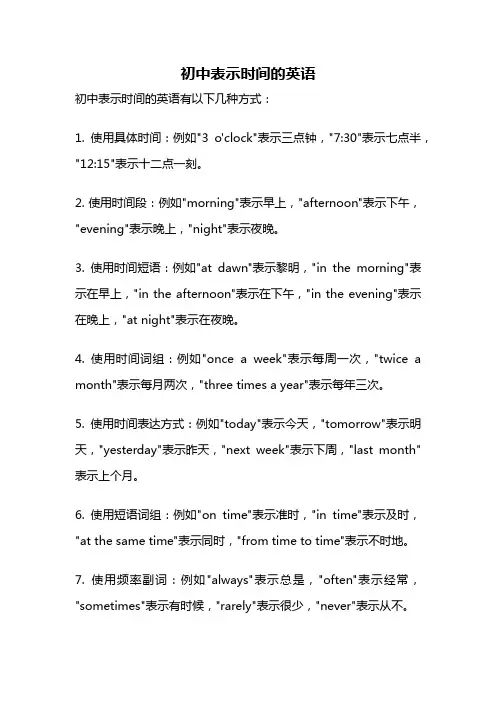
初中表示时间的英语初中表示时间的英语有以下几种方式:1. 使用具体时间:例如"3 o'clock"表示三点钟,"7:30"表示七点半,"12:15"表示十二点一刻。
2. 使用时间段:例如"morning"表示早上,"afternoon"表示下午,"evening"表示晚上,"night"表示夜晚。
3. 使用时间短语:例如"at dawn"表示黎明,"in the morning"表示在早上,"in the afternoon"表示在下午,"in the evening"表示在晚上,"at night"表示在夜晚。
4. 使用时间词组:例如"once a week"表示每周一次,"twice a month"表示每月两次,"three times a year"表示每年三次。
5. 使用时间表达方式:例如"today"表示今天,"tomorrow"表示明天,"yesterday"表示昨天,"next week"表示下周,"last month"表示上个月。
6. 使用短语词组:例如"on time"表示准时,"in time"表示及时,"at the same time"表示同时,"from time to time"表示不时地。
7. 使用频率副词:例如"always"表示总是,"often"表示经常,"sometimes"表示有时候,"rarely"表示很少,"never"表示从不。
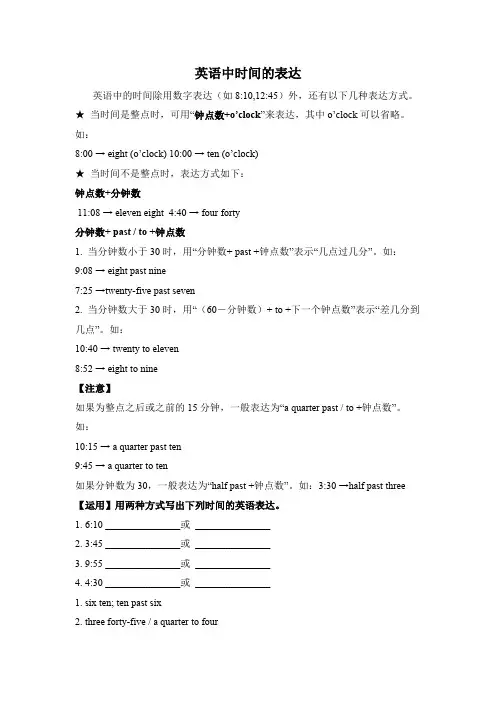
英语中时间的表达英语中的时间除用数字表达(如8:10,12:45)外,还有以下几种表达方式。
★当时间是整点时,可用“钟点数+o’clock”来表达,其中o’clock可以省略。
如:8:00 → eight (o’clock) 10:00 → ten (o’clock)★当时间不是整点时,表达方式如下:钟点数+分钟数11:08 → eleven eight 4:40 → four forty分钟数+ past / to +钟点数1. 当分钟数小于30时,用“分钟数+ past +钟点数”表示“几点过几分”。
如:9:08 → eight past nine7:25 →twenty-five past seven2. 当分钟数大于30时,用“(60-分钟数)+ to +下一个钟点数”表示“差几分到几点”。
如:10:40 → twenty to eleven8:52 → eight to nine【注意】如果为整点之后或之前的15分钟,一般表达为“a quarter past / to +钟点数”。
如:10:15 → a quarter past ten9:45 → a quarter to ten如果分钟数为30,一般表达为“half past +钟点数”。
如:3:30 →half past three 【运用】用两种方式写出下列时间的英语表达。
1. 6:10 _______________或_______________2. 3:45 _______________或_______________3. 9:55 _______________或_______________4. 4:30 _______________或_______________1. six ten; ten past six2. three forty-five / a quarter to four3. nine fifty- five / five to ten4. four thirty / half past four给大家推荐一个英语微信群Empty Your Cup英语微信群是目前学习英语最有效的方法,群里都是说英语,没有半个中文,而且规则非常严格,是一个超级不错的英语学习环境,群里有好多英语超好的超牛逼的人,还有鬼佬和外国美眉。
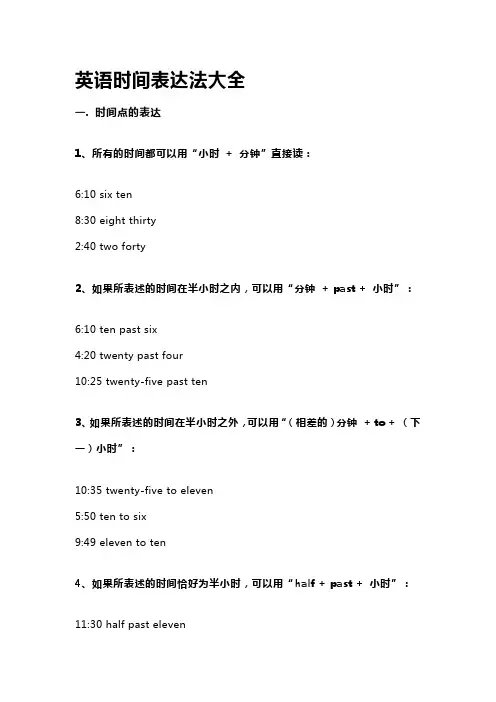
英语时间表达法大全一. 时间点的表达1、所有的时间都可以用“小时+ 分钟”直接读:6:10 six ten8:30 eight thirty2:40 two forty2、如果所表述的时间在半小时之内,可以用“分钟+ past + 小时”:6:10 ten past six4:20 twenty past four10:25 twenty-five past ten3、如果所表述的时间在半小时之外,可以用“(相差的)分钟+ to + (下一)小时”:10:35 twenty-five to eleven5:50 ten to six9:49 eleven to ten4、如果所表述的时间恰好为半小时,可以用“half + past + 小时”:11:30 half past eleven2:30 half past two5、如果所表述的分钟和15有关,就有三种表达法:(15分钟又叫一刻钟:a quarter)9:15 nine fifteen ; fifteen past nine ; a quarter past nine3:45 three forty-five ; fifteen to four ; a quarter to four6、整点的表达:现在是两点整。
It's two./It's two o'clock.另外英语中的noon 和midnight 可分别直接表示白天和夜晚的12点:It's (twelve) noon. 现在是中午十二点。
It's (twelve) midnight. 现在是半夜零点。
7、大约时间:It's almost two. 马上到两点了。
It's not quite two. 还不到两点。
It's just after two. 刚过两点。
8、若想表明是上午,可在时间后加上a.m.如:thirteen past six a.m.(上午六点十三分)。
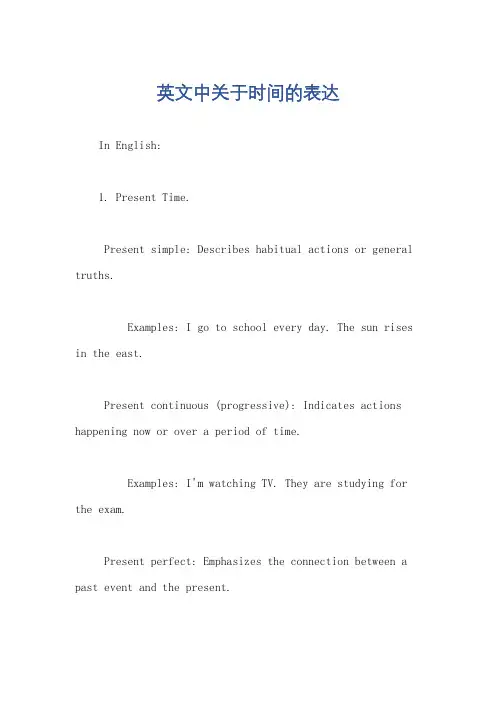
英文中关于时间的表达In English:1. Present Time.Present simple: Describes habitual actions or general truths.Examples: I go to school every day. The sun rises in the east.Present continuous (progressive): Indicates actions happening now or over a period of time.Examples: I'm watching TV. They are studying for the exam.Present perfect: Emphasizes the connection between a past event and the present.Examples: I have studied English for five years. She has just finished her work.Present perfect continuous: Focuses on the duration or ongoing nature of an action.Examples: I have been working on this project for two hours. They have been arguing for days.2. Past Time.Past simple: Refers to completed actions in the past.Examples: I went to the park yesterday. They played football last week.Past continuous (progressive): Describes actions taking place at a specific time in the past.Examples: I was sleeping when the phone rang. They were eating dinner at 8 pm.Past perfect: Indicates an action that occurred before another action in the past.Examples: I had finished my work before you arrived. She had lost her keys before she left the house.Past perfect continuous: Emphasizes the duration of an action prior to a point in the past.Examples: I had been waiting for the bus for an hour. They had been living in London for five years.3. Future Time.Future simple: Expresses actions that will happen at a specific time or in the future.Examples: I will meet you tomorrow. They will finish the project next month.Future continuous (progressive): Indicates actionsthat will be in progress at a specific time in the future.Examples: I will be studying at the library tonight. They will be traveling to Paris next summer.Future perfect: Conveys the idea that an action will be completed before another action in the future.Examples: I will have graduated by next year. She will have retired before she turns 60.Future perfect continuous: Highlights the duration of an action that will have been ongoing before a point in the future.Examples: I will have been working for this company for five years by next June. They will have been living in the same house for over a decade.4. Conditional Sentences.Zero conditional: Describes general truths or universal facts.Examples: If it rains, the ground gets wet. When you press the button, the light turns on.First conditional: Expresses a possible or probable event based on a condition.Examples: If I study hard, I will pass the exam.If you take a taxi, you will be there on time.Second conditional: Indicates a hypothetical or unlikely situation.Examples: If I were a millionaire, I would travel around the world. If it rained, the game would be canceled.Third conditional: Refers to events that did not happen in the past due to a different situation.Examples: If I had studied harder, I would have passed the test. If they had arrived on time, they would not have missed the flight.5. Relative Clauses.Defining relative clauses: Restrict or define the noun they modify.Examples: The book that I'm reading is very interesting. The man who lives next door is a doctor.Non-defining relative clauses: Provide additional information without defining the noun.Examples: The book, which I bought yesterday, is very interesting. The man, who is my neighbor, is a doctor.Relative adverbs: Connect a relative clause to a main clause and serve specific functions.Examples: Where I live is beautiful. The reason why I'm here is to help you.In Chinese:1. 现在时。
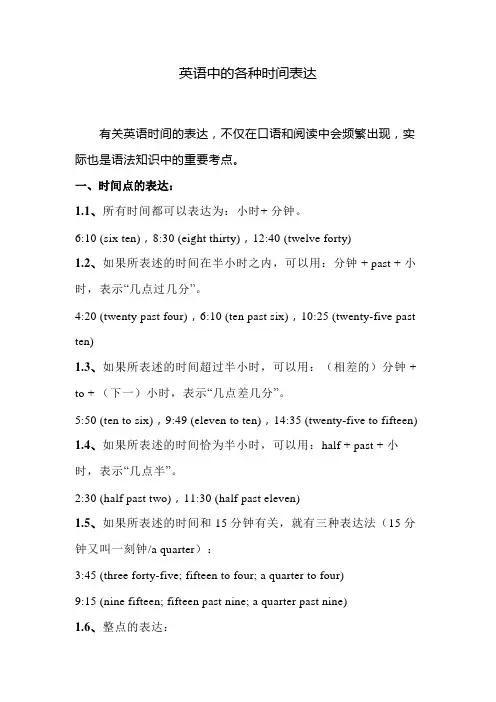
英语中的各种时间表达有关英语时间的表达,不仅在口语和阅读中会频繁出现,实际也是语法知识中的重要考点。
一、时间点的表达:1.1、所有时间都可以表达为:小时+ 分钟。
6:10 (six ten),8:30 (eight thirty),12:40 (twelve forty)1.2、如果所表述的时间在半小时之内,可以用:分钟 + past + 小时,表示“几点过几分”。
4:20 (twenty past four),6:10 (ten past six),10:25 (twenty-five past ten)1.3、如果所表述的时间超过半小时,可以用:(相差的)分钟 + to + (下一)小时,表示“几点差几分”。
5:50 (ten to six),9:49 (eleven to ten),14:35 (twenty-five to fifteen) 1.4、如果所表述的时间恰为半小时,可以用:half + past + 小时,表示“几点半”。
2:30 (half past two),11:30 (half past eleven)1.5、如果所表述的时间和15分钟有关,就有三种表达法(15分钟又叫一刻钟/a quarter):3:45 (three forty-five; fifteen to four; a quarter to four)9:15 (nine fifteen; fifteen past nine; a quarter past nine)1.6、整点的表达:现在是两点整。
It's two. / It's two o'clock. 注:noon和midnight 可分别直接表示白天和夜晚的12点。
It's (twelve) noon. 现在是中午十二点。
It's (twelve) midnight. 现在是半夜零点。
1.7、大约的时间:It's almost two. 马上到两点了。
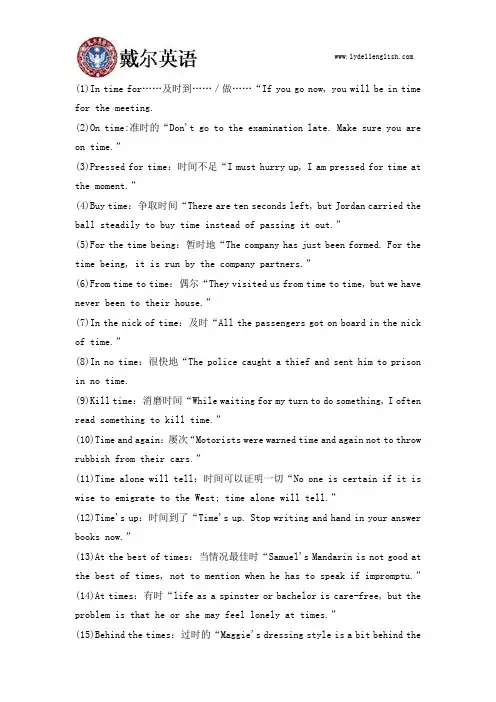
(1)In time for……及时到……/做……“If you go now, you will be in time for the meeting.(2)On time:准时的“Don't go to the examination late. Make sure you are on time.”(3)Pressed for time:时间不足“I must hurry up, I am pressed for time at the moment.”(4)Buy time:争取时间“There are ten seconds left, but Jordan carried the ball steadily to buy time instead of passing it out.”(5)For the time being:暂时地“The company has just been formed. For the time being, it is run by the company partners.”(6)From time to time:偶尔“They visited us from time to time, but we have never been to their house.”(7)In the nick of time:及时“All the passengers got on board in the nick of time.”(8)In no time:很快地“The police caught a thief and sent him to prison in no time.(9)Kill time:消磨时间“While waiting for my turn to do something, I often read something to kill time.”(10)Time and again:屡次“Motorists were warned time and again not to throw rubbish from their cars.”(11)Time alone will tell:时间可以证明一切“No one is certain if it is wise to emigrate to the West; time alone will tell.”(12)Time's up:时间到了“Time's up. Stop writing and hand in your answer books now.”(13)At the best of times:当情况最佳时“Samuel's Mandarin is not good at the best of times, not to mention when he has to speak if impromptu.”(14)At times:有时“life as a spinster or bachelor is care-free, but the problem is that he or she may feel lonely at times.”(15)Behind the times:过时的“Maggie's dressing style is a bit behind thetimes. She should try to keep up with the times by wearing fashionable dresses.”(16)Move / keep up with the times:赶上时代“Some people's mode of thinking is outdated.They should try to move with the times so as to better fit in the present society.”(17)The time is ripe for……的时机成熟了“The political leaders of the two countries have communicated with each other. Time is therefore ripe for closer cooperation.”(18)With time to spare:比预期时间早“As there was no traffic congestion, we reached the destination with time to spare.”(19)With time/Given time:假以时间“Don't feel depressed ! Things will improve with time.(20)For any length of time:短暂而已“Tom likes to work in different companies. Evidence shows that he has not held on to the same job for any length of time.”来源:戴尔英语。
盘点各种英语时间表达编辑:Alex 点击量:1042次分享到:新浪微博QQ空间腾讯微博人人网百度空间一键分享34所有的时间都可以用“小时+ 分钟”直接读:6:10 six ten8:30 eight thirty2:40 two forty如果所表述的时间在半小时之内,可以用“分钟+ past + 小时”:6:10 ten past six4:20 twenty past four10:25 twenty-five past ten如果所表述的时间在半小时之内,可以用“(相差的)分钟+ to + (下一)小时”:10:35 twenty-five to eleven5:50 ten to six9:49 eleven to ten如果所表述的时间恰好为半小时,可以用“half + past + 小时”:11:30 half past eleven2:30 half past two如果所表述的分钟和15有关,就有三种表达法:(15分钟又叫一刻钟:a quarter) 9:15 - nine fifteen ; fifteen past nine ; a quarter past nine3:45 - three forty-five ; fifteen to four ; a quarter to four整点:现在是两点整。
It's two。
It's two o'clock。
It's two o'clock sharp。
It's two o'clock on the dot。
It's two o'clock on the nose。
It's exactly two o'clock。
另外英语中的noon 和midnight 可分别直接表示白天和夜晚的12点:It's (twelve) noon. 现在是中午十二点。
一. 时间点的表达1. 所有的时间都可以用“小时+ 分钟”直接读:6:10 six ten8:30 eight thirty2:40 two forty2. 如果所表述的时间在半小时之内,可以用“分钟+ past + 小时”:6:10 ten past six4:20 twenty past four10:25 twenty-five past ten3. 如果所表述的时间在半小时之外,可以用“相差的分钟+ to + 下一小时”:10:35 twenty-five to eleven5:50 ten to six9:49 eleven to ten4. 如果所表述的时间恰好为半小时,可以用“half + past + 小时”:11:30 half past eleven2:30 half past two5. 如果所表述的分钟和15有关,就有三种表达法:15分钟又叫一刻钟:a quarter9:15 nine fifteen ; fifteen past nine ; a quarter past nine3:45 three forty-five ; fifteen to four ; a quarter to four6. 整点的表达:现在是两点整;It's two./It's two o'clock.另外英语中的noon 和midnight 可分别直接表示白天和夜晚的12点:It's twelve noon. 现在是中午十二点;It's twelve midnight. 现在是半夜零点;7. 大约时间:It's almost two. 马上到两点了;It's not quite two. 还不到两点;It's just after two. 刚过两点;8. 若想表明是上午,可在时间后加上.如:thirteen past six .上午六点十三分;若想表明是下午,可在时间后加上.如:four o'clock .下午四点;9. 句子范例①It's nine forty-five. =It's a quarter to ten.②It's two seventeen. =It's seventeen past two.③It's three. =It's three o'clock.④It's nine thirty. =It's half past nine.⑤It's six fifteen. =It's a quarter past six.⑥It's three fifty. =It's ten to four.二. 世纪、年代、年、月、日的表达1. 世纪1用“定冠词+序数词+century”表示例:在十七世纪写作:in the 17th century,读作:in the seventeenth century 2用“定冠词+百位进数+s”表示例:在十七世纪写作:in the 1600s,读作:in the sixteen hundreds注意:这种情况下,实际表达的世纪数是阿拉伯数字本身加一;2. 年代用“定冠词+世纪百位进数+十位年代数+s”表示例:在二十世纪三十年代写作:in the 1930s,读作:in the thirties of the twentieth century 或in the nineteen thirties表示某年代的早期、中期和晚期,可以在定冠词后添加early, mid-和late例如:在二十世纪二十年代早期in the early 1920s;在二十世纪五十年代中期in the mid-1950s3. 年月日1年份①读年份时一般分为两个单位来读,前两个数为一个,后两个数为一个:1949 读作:nineteen forty-nine或nineteen hundred and forty-nine②如果是三位数,先读第一位,再把后两个数合起来读:253 读作:two fifty-three或two hundred and fifty-three③另外:2000 读作:two thousand,1902 读作:nineteen hundred and two或nineteen o two④如果要使用year,year放在数词之前例如:in the year two fifty-three . 在公元前253年2月份月份是专有名词,除了少数几个月份外都有缩写形式:January - Jan. 一月February - Feb. 二月March - Mar. 三月April - Apr. 四月August - Aug. 八月September - Sept. 九月October - Oct. 十月November - Nov. 十一月December - Dec. 十二月注意:缩写形式后面的点不能省略,因为它是表示缩写形式的符号;3日期用序数词表示例:十月一日写作:October 1, October 1st, 1 October, 1st October, the 1st of October 等,其中的October都可以写成缩写形式Oct.读作:October the first或the first of October4年月日用英语表达年月日的顺序:①月\日\年例:2002年1月17日写作:January 17th, 2002或January seventeenth, 2002日和年之间需用逗号隔开读作:January the seventeenth, two thousand and two②日\月\年例:2002年1月17日写作:17th January, 2002或the seventeenth of January, 2002月和年之间需用逗号隔开读作:the seventeenth of January, two thousand and two 4. 介词的使用若指在哪一年或哪一月,用介词in;若具体到某一天,需用介词on;例如:She was born in 1989.She was born in August.She was born in August 1989.She was born on 2nd August, 1989.。
英语钟点时刻的表达方式
英语中有许多与时间相关的表达方式,尤其是在描述‘钟点时刻’时更为常见。
以下是一些常见的英语钟点时刻的表达方式:
1. 现在时间:It is + 现在的时间
例如:It is nine o'clock.
2. 半点时间:half past + 整点时间
例如:It is half past two.
3. 到达整点时间前的分钟数:minutes to + 整点时间
例如:It is ten minutes to four.
4. 到达整点时间后的分钟数:minutes past + 整点时间
例如:It is twenty minutes past eight.
5. 24小时制时间:hour + 冒号 + minute
例如:The train leaves at 19:45.
6. 精确时间:hour + 冒号 + minute + am / pm
例如:The meeting starts at 3:30 pm.
以上是几种常用的英语钟点时刻的表达方式。
掌握这些表达方式可以帮助你更加流利地表达时间。
- 1 -。
英文中的时间表达汇总,非常全面!一.时间点的表达1.所有的时间都可以用“小时+分钟“直接读:6:10 six ten8:30 eight thirty2:40two forty2.如果所表述的时间在半小时之内,可以用“分钟+past+小时“:6:10 ten past six4:20 twenty past four10:25 twenty-five past ten3.如果所表述的时间在半小时之外,可以用“(相差的)分钟+to+(下一)小时“: 10:35twenty-five to eleven5:50 ten to six9:49 eleven to ten4.如果所表述的时间恰好为半小时,可以用“half+past+小时“:11:30 half past eleven2:30 half past two5.如果所表述的分钟和15有关,就有三种表达法:(15分钟又叫一刻钟:a quarter)9:15 nine fifteen;fifteen past nine;a quarter past nine3:45 three forty-five;fifteen to four;a quarter to four6.整点的表达:现在是两点整。
It's two./It's two o'clock.另外英语中的noon 和midnight 可分别直接表示白天和夜晚的12点:It's(twelve)noon.现在是中午十二点。
It's(twelve)midnight.现在是半夜零点。
7.大约时间:It's almost two.马上到两点了。
It's not quite two.还不到两点。
It's just after two.刚过两点。
8.若想表明是上午,可在时间后加上a.m.如:thirteen past six a.m.(上午六点十三分)。
英语中的时间表达大汇总时间点的表达1.所有的时间都可以用【小时+ 分钟】直接读:6:10 six ten8:30 eight thirty2:40 two forty2.如果所表述的时间在半小时之内,可以用【分钟+ past + 小时】:6:10 ten past six4:20 twenty past four10:25 twenty-five past ten3.如果所表述的时间在半小时之外,可以用【分钟+ to + 小时】:10:35 twenty-five to eleven5:50 ten to six9:49 eleven to ten4.如果所表述的时间恰好为半小时,可以用【half + past + 小时】:11:30 half past eleven5.如果所表述的分钟和15有关,就有三种表达法:15分钟又叫一刻钟:a quarter9:15nine fifteen ; fifteen past nine ; a quarter past nine3:45three forty-five ; fifteen to four ; a quarter to four6、整点的表达:It’s two./It’s two o’clock.现在是两点整。
另外英语中的noon 和midnight 可分别直接表示白天和夜晚的12点:现在是中午十二点。
It’s (twelve) noon.现在是半夜零点。
It’s (twelve) midnight.7、大约时间:马上到两点了。
It’s not quite two.还不到两点。
It’s just after two.刚过两点。
8、若想表明是上午,可在时间后加上a.m. 如:thirteen past six a.m.上午六点十三分。
若想表明是下午,可在时间后加上p.m. 如:four o’clock p.m.下午四点。
9.句子范例1.现在九点四十五分!It’s nine forty-five. =It’s a quarter to ten.2. 现在两点十七分!It’s two seventeen. =It’s seventeen past two.3. 现在三点钟!It’s three. =It’s three o’clock.4. 现在九点半!It’s nine thirty. =It’s half past nine.5. 现在六点十五分!It’s six fifteen. =It’s a quarter past six.6. 现在三点五十分!It’s three fifty.=It’s ten to four.世纪、年代、年、月、日的表达1.世纪:①用定冠词+序数词+century表示例:在十七世纪in the 17th century读作:in the seventeenth century②用定冠词+百位进数+s表示例:在十七世纪写作:in the 1600s读作:in the sixteen hundreds注意:这种情况下,实际表达的世纪数是阿拉伯数字本身加一。
英语中的时间表达法一。
时间点的表达1、所有的时间都可以用“小时 + 分钟”直接读:6:10 six ten8:30 eight thirty2:40 two forty2、如果所表述的时间在半小时之内,可以用“分钟 + past + 小时":6:10 ten past six4:20 twenty past four10:25 twenty—five past ten3、如果所表述的时间在半小时之外,可以用“(相差的)分钟 + to + (下一)小时”:10:35 twenty—five to eleven5:50 ten to six9:49 eleven to ten4、如果所表述的时间恰好为半小时,可以用“half + past + 小时":11:30 half past eleven2:30 half past two5、如果所表述的分钟和15有关,就有三种表达法:(15分钟又叫一刻钟:a quarter)9:15 nine fifteen ; fifteen past nine ; a quarter past nine3:45 three forty-five ; fifteen to four ; a quarter to four6、整点的表达:现在是两点整。
It's two./It's two o’clock。
另外英语中的 noon 和midnight 可分别直接表示白天和夜晚的12点:It’s (twelve) noon。
现在是中午十二点。
It's (twelve) midnight。
现在是半夜零点。
7、大约时间:It's almost two。
马上到两点了。
It’s not quite two. 还不到两点.It’s jus t after two。
刚过两点。
8、若想表明是上午,可在时间后加上a。
m.如:thirteen past six a。
有关时间的英语表达
时间:time 年:year 天:day Life:生活,生命,一生
小时:hour分钟:minute秒:second on time为准时, in time为及时。
今天:today明天:tomorrow后天:the day after tomorrow前天:
the day before yesterday早晨:morning中午:noon下午:afternoon傍晚:evening今晚:tonight晚上:night
月份/星期英语简写:
一月JanuaryJan. 二月FebruaryFeb. 三月MarchMar. 四月AprilApr. 五月MayMay
六月JuneJun. 七月JulyJul. 八月AugustAug. 九月SeptemberSep。
十月OctoberOct.
十一月NovemberNov. 十二月DecemberDec.
星期一MondayMon. 星期二TuesdayTue. 星期三WednesdayWed.
星期四ThursdayThu. 星期五FridayFri. 星期六SaturdaySat.
星期日SundaySun.
年份英语:
1840年 eighteen forty
1900年 nineteen hundred
1992年 nineteen ninety-two
2000年 twentyhundred
2003年 twenty zero three
时间成语:
1.日积月累 accumulate through long years
2. 日暮途穷at the end of one’s rope
3. 日日夜夜 day and night
4. 日新月异 fast-changing
5. 日以继夜 night and day; day in and day out
6. 分秒必争 Every minute counts.
7. 千钧一发 at a critical moment
8. 千秋万代 throughout the ages
9. 千载难逢 once in a blue moon
10. 穷年累月 year after year; from year to year
11. 日落西山 like the sun setting beyond the western hills; on the wane
12. 闰年 leap year
13. 瞬间、立刻、马上、霎时间 in an instant; in a twinkle
14. 上旬 the first ten days of a month
15. 深更半夜 late at night
16. 时过境迁 Time has changed.
17. 瞬息万变 change at every moment
18 遗臭万年 be cursed for ever by posterity; remain infamous in history
19 无时无刻 all the time; constantly
20 猴年马月donkey’s years
21 与日俱增 be on the increase day by day
22 蒸蒸日上 grow more and more prosperous
23 有朝一日 someday; when the day comes
24 指日可待 can be expected soon
25 一日千里 at tremendous speed; by leaps and bounds
26 一年到头 all the year round; throughout the year
27 有生之年the rest of one’s life; one’s remaining years
28 新纪元 new era; new epoch
29 延年益寿prolong one’s life。